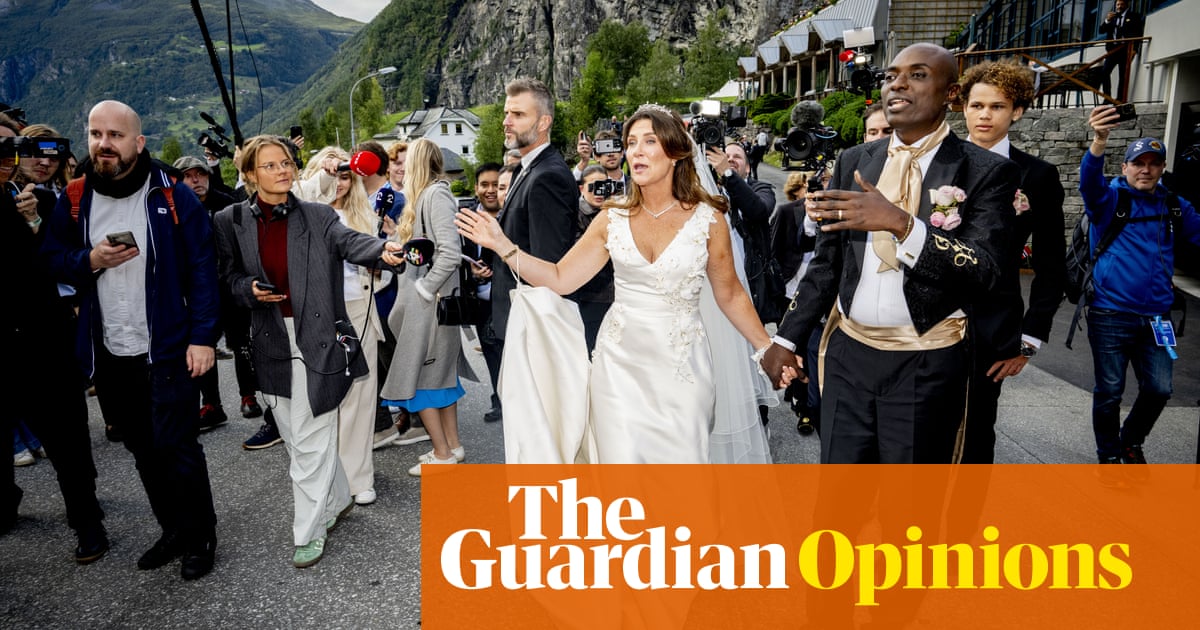It should have been an Instagram-perfect wedding image, but it turned out to be something more embarrassing. In the picturesque village of Geiranger, the jewel of Norway’s fjords and a Unesco world heritage site, Princess Märtha Louise was hurried to a tent, covered by sheets to thwart rival photographers. The photo rights of her marriage last weekend to Durek Verrett, an American shaman, had been sold exclusively to Hello! magazine.
Netflix was presumedly present as well because it holds the movie rights to the improbable love story between the princess and the shaman. Whether the newlyweds – infamous for their relentless promotion of pseudo-scientific quackery, royal profiteering and, in Verrett’s case, a belief that he’s a hybrid reptile from Andromeda who can cleanse spiritual imprints in promiscuous women’s vaginas – have found a good fit in Rebecca Chaiklin, the Tiger King director, well, that remains to be seen.
Märtha Louise, 52, is fourth in line to the Norwegian throne. From her co-founding of the notorious Angel academy, where students paid to learn the art of clairvoyance, to her many dubious ventures with 49-year-old Verrett, she has always exploited her royal title for private gain, despite numerous warnings.
Fitting the general theme of her wedding, clothes from Märtha’s own fashion collection were on sale to the guests in a pop-up shop. The bride’s father, King Harald V – refusing to take part in any commercial endeavour – patiently waited in a car with the other royals while the photographers finished. Who knows what was going through his mind.
Feudal titles may not sit well with most Norwegians, much like capitalist greed. What we saw at this wedding is what happens when feudal privileges and market capitalism converge. It goes straight to the heart of a distinctly Norwegian paradox: how can such an apparently egalitarian country, where nobility was abolished in 1821, still support a royal family? Isn’t the institution’s very existence an affront to everything Norwegian society purports to stands for?
The reason we still have a royal family, I suspect, has to do with history as well as how the Norwegian royals have executed their role. When the country elected a young Glücksburg prince as King Haakon VII in 1905, it was a post-colonial act of self-determination against Sweden and Denmark. Norwegians came to love Haakon VII for his patriotism and resolute defiance against the German occupiers during the second world war.
His successor, Olav V, may have been an authoritarian father and privately indulgent to Nazi Germany, but he was a “people’s king” who proudly took a tram during the oil crisis in 1973. Exalted, yet humble, his was a brilliant image that defined the royals for generations. You will never see the Norwegian king wearing a crown, but you will definitely see the royals in ski boots.
If his two precursors embodied the patriotic fervour and down-to-earth modesty that foreigners so often associate with Norway, King Harald added an honesty suited to our times. During his reign, openness to life’s struggles and an acceptance of differences became the hallmark.
But 2024 has turned into an annus horribilis for the royals. At the beginning of August, Marius Borg Høiby, stepson of the crown prince, Haakon, was arrested and faces charges of bodily harm and criminal damage after assaulting his girlfriend and wrecking her apartment, which he has admitted he did while being intoxicated on alcohol and cocaine. Høiby does not carry out official royal duties , but he was brought up in the royal family and is a full member.
His mother, the crown princess, Mette-Marit, was reportedly in contact with the victim just after the incident. We don’t know why yet, but if she thinks that was a wise move she may not appreciate the hidden asymmetries of power.
Two other ex-girlfriends have since accused Høiby of physical and psychological abuse (allegations he has not responded to).
I think this crisis in the royal family reveals more about monarchy as an institution and its place in modern Norway. Inherited privileges go against ordinary citizens’ sense of justice. Less obvious is the injustice that is built into the system of succession to the throne. Haakon, the heir-apparent is Märtha Louise’s younger brother, leaving other relatives in his wake. And it’s not just in Norway that the succession conundrum has caused problems for royals unlikely to inherit the throne. Look at Britain. It’s not without reason that Prince Harry called his autobiography Spare.
Märtha Louise was unlucky enough to be the first-born at a time when the monarchical line of succession in Norway was patrilineal. Perhaps if you are a royal there are few places that can make you feel as lonely and overlooked as an empty castle. Spares like Harry or Märtha Louise, or those with no claim, like Marius Høiby, without any real function, are trapped in a 24/7 epic royal reality show from which there is no exit.
While the direct line of succession seems to be in relatively capable hands, the outsiders who then go on to scandalise the institution and expose its deep internal tensions eventually undermine public trust in it.
A constitutional monarchy is little more than the public perception of it. It works only when the public have faith in it. What is left of the monarchy when members of the royal family beat up their girlfriend, undermine a healthcare system based on scientific research and methods, and use feudal titles to enrich themselves?
Recent surveys indicate that support for the monarchy in Norway has fallen steadily since 2017. Last month, nearly four out of 10 citizens said they had a more negative view of the institution.
Verrett, the shaman, has accused Norwegians of being racist and of comparing him to Rasputin. Perhaps the Russian mystic and faith healer who gained considerable influence at the Russian court a century ago should indeed serve as a warning to the Norwegian monarchy. His reputation is said to have discredited Tsarist rule, precipitating its overthrow.
